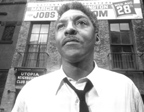






| Brother
Outsider: The Life of Bayard Rustin
Rustin was born in 1912 into a Pennsylvania Quaker family steeped in ideas of social justice and non-violence. He moved to Harlem during the socially and culturally tumultuous 1930's and, after a brief flirtation with the Communist Party found a more congenial home in A.J. Muste’s pacifist Fellowship of Reconciliation. While there, he served prison terms for resisting the draft during World War II and later for integrating interstate buses. When A. Philip Randolph, aging head of the Black labor movement, turned to the fellowship for tactical help, Rustin worked closely with him and developed a belief that the labor movement offered the best hope for Black advancement. Then in 1953, Rustin was arrested during a casual homosexual encounter. A.J. Muste forced him out of the fellowship. When the Montgomery bus boycott was launched, he went to Alabama in 1956 and became a mentor in non-violence to the 26-year-old Dr. Martin Luther King Jr. Though Rustin would advise the younger civil rights leader until his assassination in 1968, King broke publicly with Rustin in 1960, when Representative Adam Clayton Powell threatened King over the issue of Rustin’s homosexuality. But when the 1963 March on Washington was proposed, the civil rights leadership recognized there was only one man who could organize it - Bayard Rustin. After the march’s overwhelming success Rustin forged the fragile alliance between the labor unions, the Civil Rights Movement and the Democratic Party which was responsible for much of the landmark civil rights legislation of the 1960's. Later on, Rustin angered former colleagues by not speaking out against the war in Vietnam, and by taking controversial stands against Black nationalism and affirmative action. In the 1970s and 1980s, he returned to his early interest in international affairs and human rights, working on behalf of refugees around the world. Brother Outsider: The Life of Bayard Rustin contributes a fascinating new chapter to our understanding of both progressive movements and gay life in 20th-century America. For more information on Bayard Rustin www.rustin.org A. Philip Randolph: For Jobs & Freedom Freedom on My Mind At the River I Stand We Shall Overcome The Rise and Fall of Jim Crow Strange Fruit |
As Seen On PBS! “Brother
Outsider
illuminates as never before Rustin’s fascinating public career and his
equally intriguing private life. It is a film worthy of his valuable
legacy.” “An utterly wonderful
documentary. The viewer will be focused and totally absorbed on one
of the most fascinating characters of the so-called American century.
First-class documentary filmmaking all the way down. An amazing and
wonderful piece of work.” “Brother
Outsider makes
a groundbreaking contribution to a clearer understanding of how the
politics of sexuality and gender shaped the Black civil rights struggle.
It is a fascinating portrait of a remarkable human being.” "In the struggle
for African American dignity, he was perhaps the most critical figure
that many people have never heard of. It's worth taking a look at the
life and lessons of one Bayard Rustin." "A worthy tribute
and a powerful retelling of the civil-rights story, which gains a new
freshness seen through the medium of this one special man." "For young folks
who take their freedoms for granted, the entire documentary is an important
reminder that some people fought hard and put their lives on the line
to attain those freedoms." "It's an impressive
gathering of of facts and interviews about the man who was also openly
gay at a time when even many liberals, including his fellow civil-rights
activists, were homophobic." "Like Rustin,
the film is alive with ideas, fast-paced and surprising, and rich in
humanity. It’s beautiful like him … and it’s got rhythm." Producers/Directors:
Nancy Kates and Bennett Singer Executive Producer: Sam Pollard Produced in associated with the Independent Television Service (ITVS)
Video Purchase: $195
|
 He
was there at most of the important events of the Civil Rights Movement
-- but always in the background. Brother Outsider: The Life of Bayard
Rustin presents a vivid drama, intermingling the personal and the
political, about one of the most enigmatic figures in 20th-century American
history. One of the first “freedom riders,” an adviser to Dr. Martin
Luther King and A. Philip Randolph, organizer of the March on Washington,
intelligent, gregarious and charismatic, Bayard Rustin was denied his
place in the limelight for one reason -- he was also gay.
He
was there at most of the important events of the Civil Rights Movement
-- but always in the background. Brother Outsider: The Life of Bayard
Rustin presents a vivid drama, intermingling the personal and the
political, about one of the most enigmatic figures in 20th-century American
history. One of the first “freedom riders,” an adviser to Dr. Martin
Luther King and A. Philip Randolph, organizer of the March on Washington,
intelligent, gregarious and charismatic, Bayard Rustin was denied his
place in the limelight for one reason -- he was also gay.